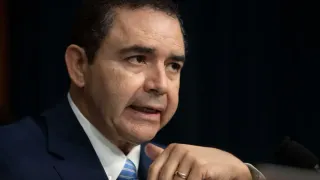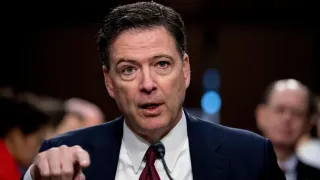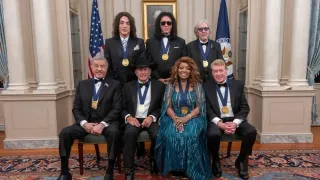February 20, 2024
Naomi Campbell Walks for Star-studded Burberry Show at London Fashion Week
Sylvia Hui READ TIME: 12 MIN.
For Londoners, rain is simply a fact of life. But for Burberry, it's the inspiration for seemingly endless variations of luxurious outerwear, from the heritage brand's best-selling trench coat to oversized duffels and fur-lined bombers.
The British fashion house showcased its latest designs Monday at London Fashion Week to a soulful Amy Winehouse soundtrack interspersed with a woman's voice saying "I love London ... the smell of London when it rains."
"Saltburn" star Barry Keoghan and "The Crown" actress Olivia Coleman were among celebrities who turned up on the VIP front row to watch the show, which drew heavily on the heritage house's military history and its signature check print.
Models wore double-breasted coats buttoned all the way up to the neck, as if bracing against the inclement British weather. Some donned mannish, oversized coats in military greens and browns paired with matching wide-leg trousers, while others covered up with an elegant silk scarf wrapped around the head.
Some models even strutted down the catwalk clutching a collapsible umbrella – in Burberry's trademark check, of course.
It's no surprise that the elements feature so prominently in the show. The fashion house's founder, Thomas Burberry, invented the fabric gabardine, a breathable material used for rainwear, in the late 1800s. The brand's trench coat, invented around the time of World War I, boasts functional designs like storm shields as well as epaulettes and gun flaps.
It's not all function and practicality. Flashes of cherry red tartan, used in the lining of a coat or glimpsed in a skirt hem, brightened up a muted palette dominated by khaki and earthy tones. Tough bomber jackets and bulky duffel coats were softened with furry hoods or collars and luxurious fur accessories.
Supermodel Naomi Campbell, sashaying in a shimmering bronze strapless column gown, rounded out the show.
Burberry is traditionally the glitziest event at London Fashion Week, which also features catwalk shows by designers including Erdem, JW Anderson, Roksanda Ilincic and Molly Goddard.
The London displays wrap up on Tuesday, when the fashion crowd decamps to Milan Fashion Week for more new season runway shows.






